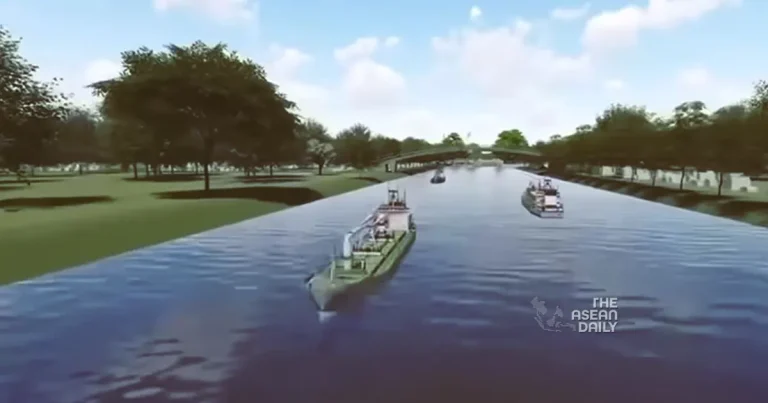30-4-2024 (PHNOM PENH) Prime Minister Hun Manet, on April 28, likened the overwhelming endorsement of the Funan Techo Canal to what he termed the “spirit of nationalism.” Remarkably, support for the project has been expressed by factions aligned with the government as well as those in opposition.
Manet made these remarks at an event commemorating International Workers’ Day on May 1. In his address, he extensively discussed the canal, highlighting the extensive backing it has received from the Cambodian populace. He pointed out that while the vast majority of Cambodians have declared their support for the 180km infrastructure initiative, Sam Rainsy, former opposition leader, remains one of the few dissenters.
“Even those who typically lean towards the opposition and often criticise me have come forward to express their support for the project. This indicates their understanding of what is best for the national interest. They recognise that the canal is for the benefit of all Cambodians.
“Do not worry that former Prime Minister Hun Sen and I will take credit for this. This project is for the benefit of all future generations,” he stated, expressing his satisfaction at the widespread approval of the new canal.
“This significant display of support is a powerful manifestation of nationalism. It demonstrates that we are all united for the betterment of the nation, the independence of the Kingdom, and that the project will serve future generations for many years to come,” he added.
The Funan Techo Canal is anticipated to cost nearly $1.7 billion and is projected to take four years to complete. While some members of the public have shown willingness to contribute funds for its construction, Manet emphasised that the government will not solicit such funding.
He also cautioned the public against responding to investment appeals, as these may be exploited by fraudsters for personal gain.
In the event of a withdrawal by a foreign investor from the project, he explained that the government would find alternative means to complete it, without resorting to public funds.
According to Manet, a framework agreement was signed with a Chinese construction company last year. Further agreements are expected to be inked, possibly in August, paving the way for construction to commence later this year or early next year.
“This is not for the benefit of the Hun family. The Hun family merely initiated it. Former Prime Minister Hun Sen initiated the project, and I will continue to see it through to fruition,” he asserted.
Some commentators in Vietnam have raised concerns that the canal may diminish the flow of Mekong River water downstream to Vietnam, potentially causing environmental repercussions in the Mekong Delta. However, both Hun Sen and Manet have assuaged these concerns.
Manet highlighted that if the canal were to prove detrimental, he and Hun Sen would bear responsibility for its construction.
“I wonder why Cambodia is being treated differently? Many countries along the Mekong have constructed canals, dams, and hydroelectric dams, but little attention was paid to them. As soon as we started discussing this project, people wanted to interrogate us. Some media outlets have suggested that Cambodia must clarify the issue with this or that individual,” he remarked.
“No, this is Cambodia’s national prerogative. For the sake of the Kingdom, we must undertake this project,” he reiterated.
Regarding concerns about reduced water flow into the Mekong Delta, Manet explained that it is estimated that only 0.06 per cent of the Mekong River’s water flowing to the sea will enter the canal.
Government spokesperson Pen Bona viewed the widespread support for the project as a definitive end to extremist ideologies in Cambodia, alluding to Rainsy.
“In summary, the extensive nationalist movement supporting the Funan Techo Canal demonstrates robust unity among Cambodians from all walks of life. They are committed to collaborating with the government to accomplish this historic task and ensure a prosperous future,” he stated in an April 29 social media post.
“This nationalist movement is isolating extremist leaders more than ever before. This signifies the end of extremist ideology in Cambodia,” he added.
Historian Dieb Sophal attributed the overwhelming public support for the project to their understanding of its immense benefits.
“Cambodian people comprehend its advantages very clearly and perceive that it will enhance Cambodia’s independence,” he remarked.
He noted that the public had also shown support for other recent infrastructure projects, such as the Siem Reap–Angkor International Airport (SAI) and Techo International Airport, among others.
“The Funan Techo Canal project will complement other recent endeavours and contribute to the Kingdom’s advancement towards becoming a high-middle-income country by 2030 and a high-income one by 2050,” he concluded.
Chhay Bora, an expert in government affairs and public policy, elucidated that through the project, Cambodia would emerge as one of the fastest-growing, most sustainable, and resilient economies globally.
He asserted that the canal would bolster Cambodia’s export capacity, streamline domestic product transport, and assist the country in diversifying its trading partners. Additionally, it would help the nation alleviate economic pressures long exerted by Vietnamese businesses and authorities.
“The government should expedite the construction and restoration of the ancient Funan Canal. It will yield long-term economic benefits and accelerate Cambodia’s graduation to an upper-middle-income country by 2030 and a high-income country by 2050,” he concluded.




